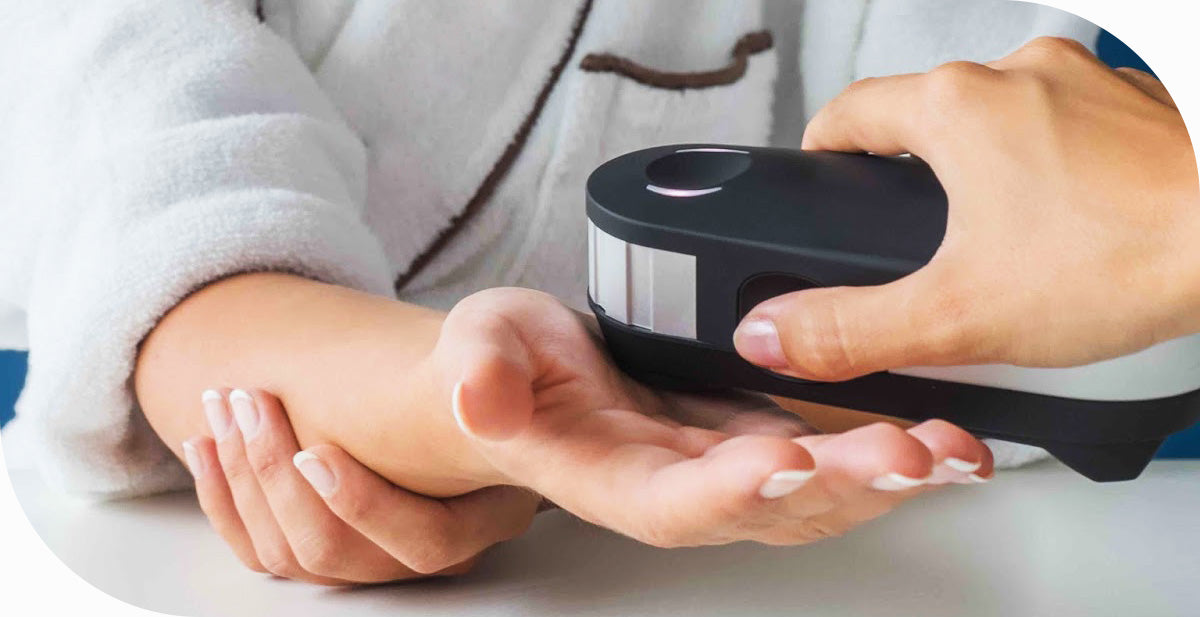
OligoScan Test in New Zealand
OligoScan uses an innovative and revolutionary method of performing detailed health checks to assess a person's health using an advanced process known as 'spectrophotometry'. The test measures mineral deficiencies, trace elements, and the accumulation of heavy metals in the tissues of the patient’s body. Using OligoScan allows us to quickly determine whether the patient has sufficient amounts of vital minerals and trace elements to make sure all parts of their immune system and metabolism are running smoothly.
What is OligoScan
How fast can you get your results?
OligoScan provides the fastest turnaround results in the world. The test can be made in minutes in the practitioner’s clinic using a portable spectrophotometer device aka the hand-scanner. The scanner is gently placed on the patient’s hand in a key 3-point sequence and collects data which is then sent in a few clicks to the secure central server at OligoScan (OligoLab). This process usually only takes a few seconds.
How different is OligoScan from other testing methods?
OligoScan is a non-invasive and pain-free method of testing and does not call for the traditionally used hair, urine, or blood specimens. These methods are helpful but have many disadvantage as they only test what’s discharged, or currently circulating in the blood.
- The hair shows what happened in the body a few week or months ago
- The urine test shows what the body excretes
- Blood shows what circulates
They are not very accurate when it comes to measuring minerals and heavy metals that are inside the cells (intracellular burden). Other methods such chelation therapy or challenge agents (DMSA, DMPS, EDTA, etc) can also be hard on the kidneys and heart, and are exclusive to certain minerals, mainly lead and/or mercury. They don’t give the whole picture.
The OligoScan test result shows us what’s in the tissue so we can assess intra-tissular Bio-availability. However other test methods are complementary to help with the diagnosis.
Why OligoScan?
- No waiting, patients get their test results in “real time”
- It measures mineral deficiencies, trace elements and the accumulation of heavy metals in the tissues of the patient’s body
- It’s pain free
- It’s affordable
- The evolution of results can be monitored over time
Why it is important to check your minerals regularly?
Your body needs minerals to operate healthily. You need nutritious food and/ or supplements to make minerals since your body can’t make them on its own. Without minerals, your body can’t function properly. Mineral deficiencies can cause serious health problems in the human body, such as anxiety, depression, muscle cramps, heart palpitations, high blood pressure, hair loss, fatigue, weak bones, decreased immune system and etc.
Some of the common reasons for mineral deficiencies are either your diet is lacking in them or you have difficulty absorbing minerals from food. Not only you can be mineral deficient, but you can also have too much of some minerals and that can cause toxicity. That’s why it’s important to check the level of your minerals regularly. OligoScan and blood tests are great tools for measuring your minerals.
Is there any recovery time involved with OligoScan?
No, not at all. OligoScan is painless and non-invasive, and the test only takes a few seconds. It’s normally done in the practitioner’s office without any preparation or recovery time. Please note that we need your blood type for OligoScan.
Which minerals do an OligoScan test measure?
OligoScan is able to determine the presence of 20 minerals, including Calcium, Magnesium, Phosphorus, Silicon, Sodium, Potassium, Copper, Zinc, Iron, Manganese, Chromium, Vanadium, Chromium, Boron, Cobalt, Molybdenum, Lodine, Lithium, Germanium, Selenium and Sulphur.
Which heavy metals do an OligoScan test measure?
OligoScan is able to determine the presence of 14 heavy metals, including, Aluminium, Antimony, Silver, Arsenic, Barium, Beryllium, Bismuth, Cadmium, Mercury, Nickel, Platinum, Lead, Thallium, and Thorium.
Can OligoScan tests be run on children?
Yes, OligoScan can be performed on children 2 years and older. Since it’s quick, painless and needle-less, it makes it an ideal way to obtain information on their minerals and heavy metals.
How reliable is OligoScan?
OligoScan uses high-frequency light spectrophotometry which allows the practitioner to determine the tissue bioavailability of minerals, trace elements and heavy metals. This is a quantitative analytical method that measures the density of minerals and heavy metals in the tissue. OligoScan is a CE Mark (Class IIa medical device) registered technology.
How often should I get an OligoScan?
We recommend a follow-up scan anywhere between 6-12 weeks after the first test.
How much does it cost?
$120 (inc. GST)- Results will be emailed after the session
